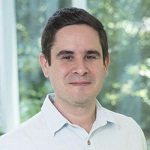 I am originally from Madrid, Spain. I grew up with the idea that I would pursue a career in science; biology and chemistry, along with history, were my favorite subjects during middle and high school. However, I decided to major in Biology – I was curious about understanding how living organisms worked.
I am originally from Madrid, Spain. I grew up with the idea that I would pursue a career in science; biology and chemistry, along with history, were my favorite subjects during middle and high school. However, I decided to major in Biology – I was curious about understanding how living organisms worked.
It was not until my sophomore year that I first considered a career in cancer research. At the time, nobody from my family had had cancer, and I had not been directly exposed to the devastating consequences of this disease. It was when I took Cell Biology and Biochemistry classes that I became interested in understanding 1) how an organized system loses control to give rise to disease (cancer), 2) how the disease (cancer) takes control of the patient's body, and 3) if we understand the biological basis of 1 and 2, can we cure cancer and improve the lives of cancer patients. Later, in my 4th year, I took one class named "Regulation of Metabolism," which exposed me to the field of signal transduction and the understanding of how our cells respond to external and internal stimuli.
Motivated to study cancer from a molecular biology (signaling) perspective and answer some of the questions I had, I embarked on a PhD in Madrid first, followed by postdoctoral training, which began in Manchester (UK) and finished in Maryland (US). My stay in Manchester was a turning point primarily because I took on a project related to a clinical trial named TARGET that sought to conduct molecular analysis of tumors to enroll patients into early-phase clinical trials. The project involved collaboration with oncologists, and I witnessed firsthand that the research we do in the lab can impact patient outcomes. At the time, two relatives of mine were diagnosed with cancer, and I saw how some traditional treatments, such as chemotherapy, reduce the quality of life and can harm the patient. Witnessing this made me more determined to focus my career on precision medicine/targeted therapies, as these treatments generally have fewer side effects and can sometimes be more efficient than chemotherapy.
After three lab relocations (including one international) during my postdoctoral training and one pandemic, I landed my current position as an Assistant Professor at the Lewis Katz School of Medicine (Temple University) and Fox Chase Cancer Center in September 2022. This position comes with new challenges, such as building a cohesive team, managing time, and a long etcetera. Yet, it is gratifying to witness undergrad students' excitement when they make their first experiments, graduate students embarking on their PhD training, or postdoctoral fellows sharing new results and thinking together about further research directions or establishing new collaborations.
As with any journey, there have been and will be many ups and a few "downs." The good news is that we do not walk alone, and I have been fortunate to always count on the support of my family, friends, and colleagues, as well as the encouragement and example of my prior and current mentors and trainees. They all motivate me to pursue my passion for improving cancer patients' lives through research and become a supportive mentor.